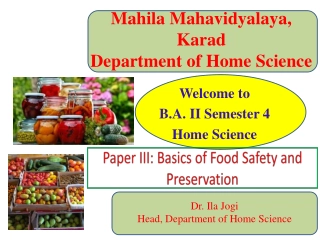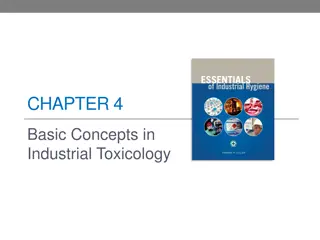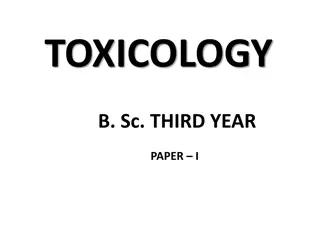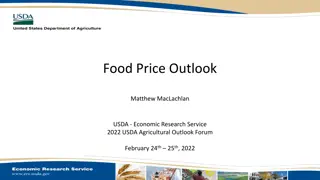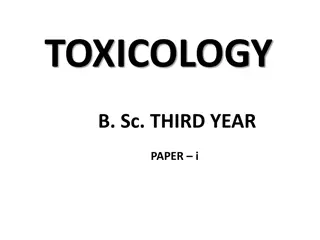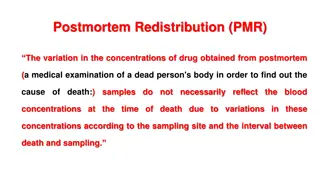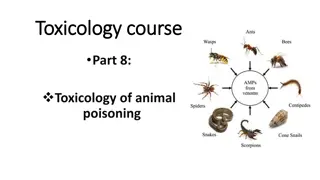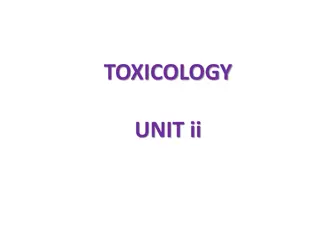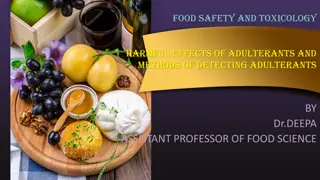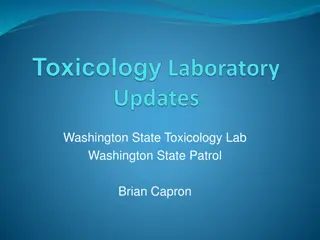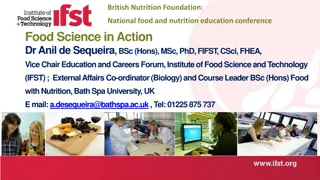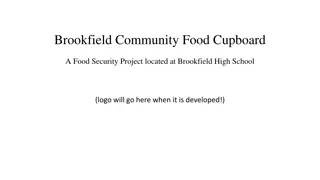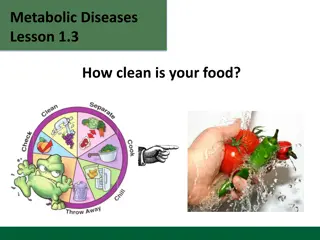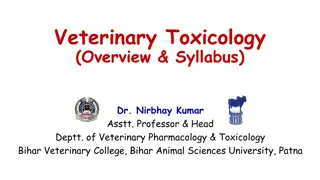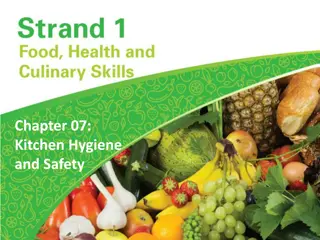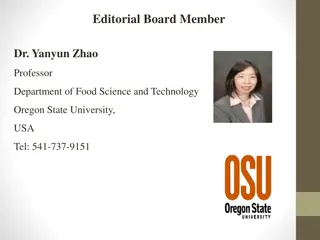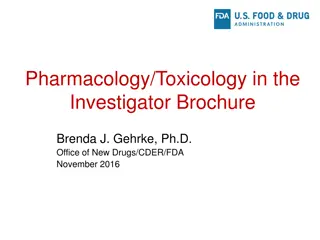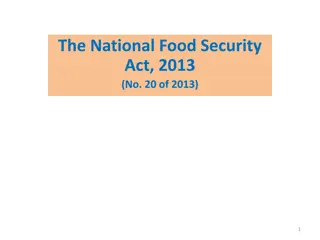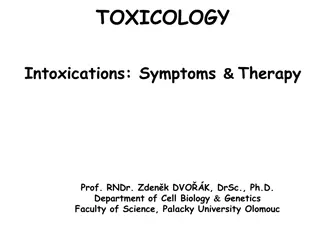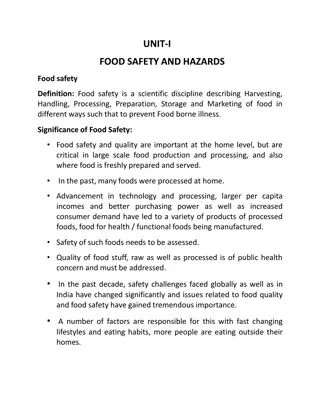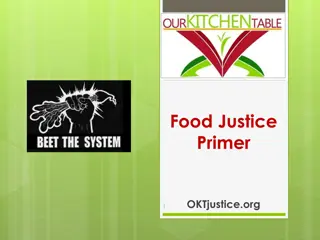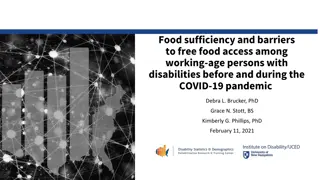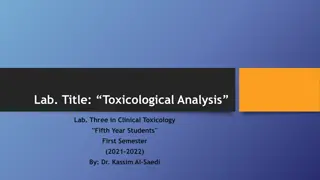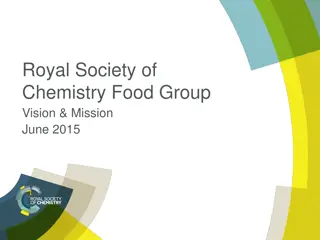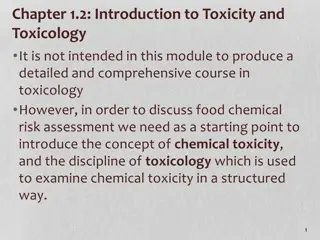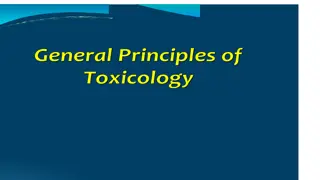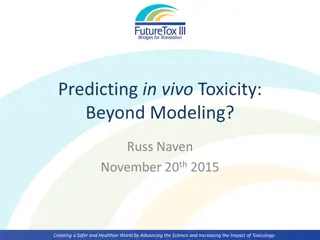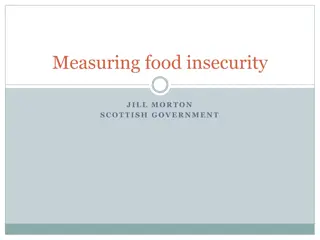BSc Food Science & Human Nutrition Programme Overview
This BSc Food Science & Human Nutrition programme at Maynooth University offers a comprehensive understanding of nutrition, biology, and chemistry as applied to food. With a focus on ingredients, production, products, and nutrition, students explore various aspects of food science including food saf
3 views • 12 slides
Comprehensive Guide to Food Safety and Preservation in Home Science
Explore the world of food safety and preservation through this detailed course in Home Science at Mahila Mahavidyalaya, Karad. The course covers topics like basics of food safety, principles of food preservation, methods of food preservation, and practical sessions on preparing various food items. G
0 views • 6 slides
Understanding Food Safety in Hospitality and Catering
Learners will explore food-related causes of ill health in hospitality and catering, including microbes and bacteria that can lead to food poisoning. Factors such as warmth, time, food supply, and moisture create ideal conditions for harmful bacteria to thrive and cause illness. This topic covers fo
5 views • 75 slides
Transforming School Food Education for Health and Wellbeing
The Food Education Roadmap aims to prioritize health and wellbeing through food for students, promoting a culture of healthy eating, wellness, and lifelong habits. It emphasizes access to healthy food, nutrition education, experiential learning, and community involvement. The initiative requires col
2 views • 12 slides
Role of Microorganisms in Food and Industry
Microorganisms play a crucial role in the food and industrial sectors, both benefiting and causing harm. They are involved in processes such as organic compound transformation, fermentation, and food production. While beneficial microorganisms contribute to the creation of various useful food produc
5 views • 44 slides
How are plant essential oils valuable as functional ingredients
Food Research Lab is one of the leading food industry consultants and offers various food production services. We provide food production and food manufacturing consultancy services to food, beverage and nutraceutical companies. Primary food production involves everything from food procurement, inve
8 views • 12 slides
Understanding Basic Concepts in Industrial Toxicology
Industrial toxicology is a vital field that studies the effects of various agents on organism health through mechanisms of action, toxicokinetics, and more. It explores toxic chemical absorption, distribution, metabolism, and elimination, as well as toxic effects on major organ systems. Learn about
0 views • 35 slides
Understanding Toxicology: Dose-Response and Toxicity Assessment
The study of toxicology involves understanding dose-response relationships, lethal concentrations, tolerance limits, toxicity curves, and factors influencing toxicity. Dose, response, acute toxicity, chronic toxicity, LD50, and ED50 are key concepts in toxicology that help assess the effects of chem
2 views • 24 slides
Overview of Food Price Trends and Consumer Expenditures in the US
The presentation highlights the consumer spending on food, food price trends over time, 2021 food prices, and forecasts for 2022 in a historical context. It emphasizes that U.S. consumers spent 12% of their expenditures on food in 2020, aligning with historical averages. Food price inflation remaine
0 views • 21 slides
Introduction to Toxicology: Science and Impact on Living Organisms
Toxicology is the study of adverse effects of chemicals on living organisms. It assesses probability of occurrence, quantitatively and qualitatively analyzing toxic effects. Toxicants are agents causing harmful responses in biological systems. Environmental toxicology focuses on pollutants' effects
0 views • 12 slides
Understanding Postmortem Redistribution in Forensic Toxicology
Postmortem Redistribution (PMR) refers to the variation in drug concentrations obtained from postmortem samples, which may not accurately reflect the levels at the time of death due to redistribution mechanisms. In forensic toxicology, assessing drug severity relies on blood concentrations, with cha
0 views • 16 slides
Understanding Animal Venom and Snake Classification in Toxicology
Animal venom, particularly snake venom, contains various toxins that can have detrimental effects on the body. Different types of snake venom target specific systems, such as neurotoxic venom affecting neuromuscular junctions and hemotoxic venom impacting the cardiovascular system. Understanding the
4 views • 27 slides
Overview of Toxicology: Understanding Chemical Risks and Health Impacts
Toxicology is a crucial field that assesses the effects of various toxic substances on human health and the environment. From heavy metals to solvents, radiation, pesticides, and animal toxins, this discipline plays a vital role in identifying and managing risks associated with exposure to harmful c
0 views • 25 slides
Food Safety and Toxicology: Adulterants and Detection Methods
Food adulteration can have harmful effects on health by altering the natural composition of food. Learn about the risks of adulterants, their effects, and methods for detecting them in food products. Ensuring food safety is crucial to prevent toxic compounds and nutrient deficiencies that can impact
0 views • 15 slides
Food Equipment Usage Guidelines for Safe Food Handling
Enhance your knowledge on using equipment for making food with proper safety procedures. Learn about essential points like wearing protective gear, checking hot food temperatures, food safety principles, and sanitization requirements. Understand machine settings, food temperature checks, and serving
1 views • 22 slides
National Food Reserve Agency (NFRA): Enhancing Food Security in Nigeria
The National Food Reserve Agency (NFRA) under the Federal Ministry of Agriculture & Water Resources plays a crucial role in addressing agricultural production, storage, and marketing challenges in Nigeria. With a vision to ensure sustainable food access for all Nigerians and become a global food pro
1 views • 30 slides
Toxicology Laboratory Updates and Certifications
The Washington State Toxicology Lab, under the Washington State Patrol, has recent staffing updates, including new hires and return of staff on maternity leave. Updates on validated methods and toxicologist certifications are provided, showcasing the lab's commitment to quality and accuracy. A new t
0 views • 26 slides
Best Practices for Food Preparation to Ensure Food Safety
This chapter highlights essential practices for prepping food to prevent cross-contamination and time-temperature abuse in a food service setting. Topics covered include safe methods for thawing food, cooking temperatures, microwave cooking, informing consumers of risks, requirements for partially c
1 views • 25 slides
Exploring Food Science and Technology in Modern Society
Delve into the world of food science and technology with insights on what scientists do, the importance of understanding food, definitions of food science and food technology, factors affecting food spoilage, and traditional and modern food processing technologies. Gain knowledge on testing hypothes
0 views • 22 slides
Food Safety Practices in Service Industry
This chapter focuses on the essential food safety practices in the service industry, covering topics such as time and temperature requirements for holding food, ways to prevent time-temperature abuse and cross-contamination, minimizing bare-hand contact with food, preventing staff and customers from
0 views • 26 slides
Brookfield Community Food Cupboard: Addressing Food Insecurity at Brookfield High School
Brookfield Community Food Cupboard is a project aiming to provide food security to individuals and families in the Riverside Park/Hunt Club area, including students and families served by Brookfield High School. The initiative seeks to supplement existing food security programs by offering a day's w
0 views • 11 slides
Food Safety and Preventing Food-borne Illness
This lesson focuses on the importance of food safety, addressing how clean our food is and at what points safety can be compromised. It delves into common types of microbes that contaminate foods and explores ways in which food safety can be compromised. The activity involves case studies on food sa
0 views • 11 slides
Mastering Good Food Hygiene and Storage Practices
Understanding food spoilage causes, common food-poisoning bacteria, conditions for bacterial growth, ways to prevent food contamination, safe food handling practices, HACCP concept, types of perishable foods, importance of proper food storage, packaging materials for food, and recognizing signs of f
1 views • 27 slides
Overview of Veterinary Toxicology Syllabus and Topics Covered
Detailed overview of the Veterinary Toxicology syllabus including general toxicology, toxicity caused by metals and non-metals, poisonous plants, agrochemical toxicity, fungal and bacterial toxins, venomous bites and stings, and more. The syllabus covers a wide range of topics related to toxicology
0 views • 12 slides
Understanding Kitchen Hygiene and Food Safety
Kitchen hygiene and food safety are crucial to prevent food spoilage and food poisoning. Factors like enzymes, micro-organisms, and oxygen can lead to food spoilage, while food poisoning occurs when pathogenic bacteria multiply in consumed food. Practicing proper hygiene, storage, and preparation me
0 views • 27 slides
Dr. Yanyun Zhao - Food Science & Technology Professor at Oregon State University
Dr. Yanyun Zhao is a prominent Professor at Oregon State University specializing in food science and technology. With a strong research focus on food processing technologies and food safety, Dr. Zhao has made significant contributions to the field. Her expertise in value-added food processing, antim
0 views • 16 slides
Understanding Pharmacology and Toxicology in Investigator Brochures
Explore the essential aspects of pharmacology and toxicology covered in Investigator Brochures, including nonclinical information, safety pharmacology, general toxicology, genetic toxicology, and more. Learn about the significance of pharmacology in predicting intended and unintended effects, consid
1 views • 40 slides
National Food Security Act, 2013 Overview
The National Food Security Act, 2013 (NFSA) aims to ensure food and nutritional security for all by providing access to adequate quality food at affordable prices. It includes provisions for hot cooked meals, food security allowance, social audit, nutritional support for children, and various monito
0 views • 15 slides
Overview of Toxicology: Intoxications, Symptoms, and Therapy
Understanding toxicology is crucial to dealing with various types of intoxications, including accidental, foodborne, inhalation, industrial, and intentional exposures. Symptoms of toxic exposure can vary widely, affecting different body systems such as the cardiovascular, respiratory, and nervous sy
0 views • 9 slides
Importance of Food Safety in Modern Food Production
Food safety is crucial in modern food production to prevent foodborne illnesses. With advancements in technology and increased demand for processed foods, the need to ensure the safety and quality of food has become paramount. Factors affecting food safety include poor hygiene practices, contaminate
0 views • 30 slides
Understanding Food Justice and Insecurity: A Comprehensive Overview
Food Justice Primer provides insightful definitions and discussions on key concepts such as food justice, food insecurity, food sovereignty, and food deserts. It highlights the need for equitable sharing of benefits and risks in the food system, aiming to transform current disparities and inequities
0 views • 49 slides
Food Sufficiency and Barriers to Free Food Access Among Working-Age Persons with Disabilities Before and During COVID-19 Pandemic
Working-age persons with disabilities face economic vulnerability and higher chances of living in food-insecure households. This study explores food sufficiency and barriers to accessing free food during the COVID-19 pandemic. Data was collected through an online survey, revealing insights into food
1 views • 14 slides
Analytical Toxicology: Techniques and Sample Analysis in Clinical Toxicology
Analytical toxicology involves the observation, identification, and measurement of foreign compounds in biological and other samples, such as urine, blood, stomach contents, nails, hair, and DNA. Various techniques are used to isolate and identify drugs and poisons present in these samples. This fie
0 views • 12 slides
Royal Society of Chemistry Food Group Vision & Mission Summary
The Royal Society of Chemistry Food Group aims to lead, promote, and disseminate the understanding and importance of chemistry in food. Their vision is to enhance food and nutrition security through advancing the chemistry of food ingredients. They strive to engage with various communities to promot
0 views • 4 slides
Introduction to Toxicity and Toxicology in Food Chemical Risk Assessment
This module introduces the concept of chemical toxicity and the discipline of toxicology in relation to food chemical risk assessment. It touches upon historical aspects, such as the case of Socrates' death by hemlock, the contributions of Mathieu Joseph Bonaventure Orfila in forensic toxicology, an
0 views • 18 slides
Understanding Toxicology and Measures of Toxicity
Toxicology is the study of the adverse effects of chemicals on living organisms, involving xenobiotics and poisonous substances. Toxicologists examine the nature of these effects, testing in lab animals for measures of toxicity such as mortality, teratogenicity, carcinogenicity, and mutagenicity. Ke
0 views • 18 slides
Advancing In Vivo Toxicity Prediction Beyond Modeling
Explore the challenges and opportunities in predicting in vivo toxicity beyond traditional models. Learn about confidence in toxicity prediction, recently discontinued drugs due to safety concerns, and the importance of recognizing toxicological signals in preclinical stages. Discover how computatio
0 views • 27 slides
Understanding Food Insecurity Measurement in Scotland
The report emphasizes the importance of understanding and addressing food insecurity effectively in Scotland. It discusses the dignity in ending hunger, the rights to nutritious food, and the limitations of emergency food aid. The Food Insecurity Experience Scale is highlighted as a tool for measuri
0 views • 7 slides
Understanding Food and Nutritional Toxicology
Food and nutritional toxicology delve into the science of poisons, toxins, and toxicants found in food. It covers substances harmful to consumers, including natural toxicants, contaminants, and additives. Nutritional toxicology focuses on the overlap between nutrition and toxicology, exploring the i
0 views • 17 slides
Understanding Food Costing and Pricing in the Food Industry
Explore the factors influencing food costs in the restaurant industry, including the importance of food cost percentage, pricing strategies, and impact of location on food prices. Learn about managing food costs, controlling waste, and optimizing profitability through effective cost analysis and men
0 views • 12 slides

